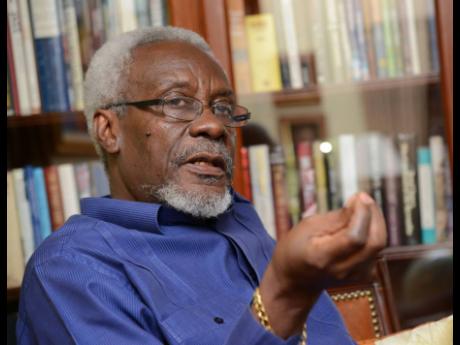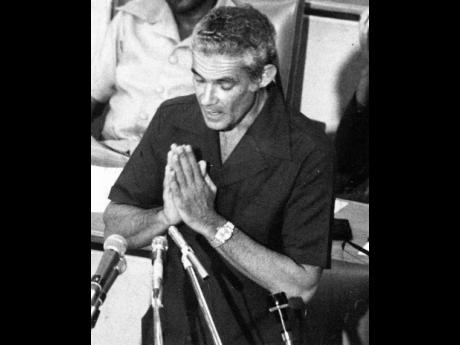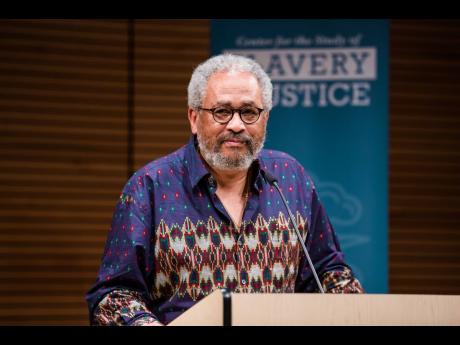50 years since ‘Better Must Come’
PNP urged to reclaim the gains of the Michael Manley era
A half-century since the People’s National Party (PNP) swept to power on the shoulders of its charismatic late former leader Michael Norman Manley, and on a promise that “better must come”, the party’s dreams, visions and efforts for a more equitable society are on the brink of total reversal of all that was gained, said respected Brown University Professor Anthony Bogues.
Bogues, who is in the island to hold discussions with Comrades as part of a commissioned-PNP study, said Comrades and supporters who were part of the campaign in 1972, and throughout the 1970s, have seen a significant about-turn of accomplishments made during the Manley years.
Class and economic equality have almost been reversed, and he said Jamaica should hold a truth and reconciliation commission before memories fail and people die.
Addressing the state of politics today, he sounded sirens.
“The Jamaican political system is in a crisis. Part of the post-colonial political crisis in the country is that the political parties and government have not solved some the most fundament issues of the Jamaican society. Some of those are education, healthcare, employment with dignity, but also quite frankly, this society coming out of colonialism was and is still structured along class and colour lines; there is a tremendous amount of inequality in this country, all imbalances Manley sought to address in the 1970s,” Bogues shared with The Sunday Gleaner last week.
According to him, the inequality was not just about the gap between rich and poor, but a structured inequity that impacted the life of ordinary people every day, from the justice system to address disqualification. He described it “as structured institutional social relationship inequity that has existed since colonialism, but which has been severely reversed since the 1980s and reinscribed”.
That, he said, has created the problem within the politics.
“So 50 years since 1972, what you have is a reversal of the 1970s and reinstituting some of the colonial era relics. And I am not saying we are under colonialism, but some of the social structures have actually reorganised themselves. They may not look the same because we don’t have the same kind of economy, but some of the same attitudes and social relations have returned,” argued Bogues.
Polls reflecting large numbers in the ‘undecided’ and ‘neither’ sections are because there are no discernible differences between the PNP and the Jamaica Labour Party (JLP), although they are not the same.
He holds that “the country is yet to come to grips with what happened in the 1980s, but for the PNP the defeat was electorally and ideologically. The party did not discuss the changing political currents and its own position, after it was accepted that post Ronald Reagan and Margaret Thatcher, the world changed ideologically and politically”.
Bogues’ assessment is a far cry from the wave of nationalism, protest and energy that followed the party in the campaign towards the massive win in 1972.
The PNP won 37 of the 53 seats and Manley was sworn in as Jamaica’s new prime minister on March 2, 1972.
Manley’s successor and former prime minister, PJ Patterson, was not only close to Michael, but to his father, National Hero Norman Manley – the party’s first leader.
During an interview last week, Patterson said the PNP began rebuilding and election planning after the crushing defeat in the 1967 general election.
“Norman Manley began the process that would define the PNP’s future, while still consistent with the mission on which the party was founded, that is building a Jamaica where people of all stripes and colour would be proud to call home,” recalled Patterson.
As is now customary, following the election loss, NW Manley established a reappraisal committee which Patterson chaired. The purpose, he said, was to win “power for the black masses from which our founding fathers came”.
Michael, after a vigorous and bitter campaign – not unlike those which have characterised the party since the elections to choose Patterson’s successor – became its second leader after defeating Vivian Blake.
According to Patterson, “a groundswell of Jamaicans toured with the PNP” and they came from all walks of life “in what was a total mobilisation of the Jamaican people”.
Some campaign issues were ready-made, including the banning of outstanding Guyanese academic Dr Walter Rodney by the JLP government. The social and economic conditions were being immortalised in protest music, and high levels of literacy and the alienation of the middle class were campaign issues.
“As campaign director, I ceased my legal practice in 1971. One of the things we organised was a musical tour of the island which we called Bandwagon. It brought together the top musical vintage bands. They were singing the songs of protest, of the inequities which existed in the society. Songs like Beat down Babylon, Carry guh Bring Come and Everything Crash. But one song, Better Mus Come One Day, would provide the campaign slogan for the 1972 elections,” Patterson recalled.
He said if the elections were held right after the tour ended, the PNP would have won more seats. An existing law banned live music at campaigns.
“It was a convincing victory for the PNP,” said Patterson.
Manley, he said, brought new energy to the party from the working class through his work with the National Workers Union (NWU). Alliance and solidarity with small countries that were emerging from years of colonialism were also important to the party and relationships that were built.
A WAVE A SOCIAL CHANGE, AND DEMOCRATIC SOCIALISM
A massive wind of social change followed the electoral sweep on February 29, 1972 and was the foundation on which the PNP government built an unmatchable edifice of profound social change. Manley, through legislative action, sought to rectify the pain, suffering and humiliation of the black majority.
Sweeping legislative changes blanketed the first term and among the first act the was creation of the literacy programme through what was known as JAMAL, which tackled the more than 70 per cent illiteracy at the time. Patterson, who considered literacy fundamental to human development, suggested that the legislative reforms were summed up in Neville Martin’s The Message, popularly referred to as My Leader Born yah.
“In 1974, all of what the PNP government was trying to do was brought together under the declaration of democratic socialism. Individuals who benefited from the programme were joyful, but there was a gradual peeling off of support because they saw it as a threat to their entrenched positions of privilege,” said Patterson.
When Manley declared the PNP democratic socialist during the Cold War era, it brought swift and immediate reaction from the Jamaican oligarchy and skilled and capital flight began in earnest. So did the tempo of political violence.
Manley’s years were under the Cold War era and the geopolitics was simple – the left versus the right.
BUILDING POLITICAL BRIDGES
Manley’s government, through international alliances with countries in the Global South and other political parties of like ideologies, sought educational advancement programmes for Jamaicans. Through party-to-party and government-to-government scholarships, thousands of Jamaicans were trained in varying professions, a majority in medicine, especially in Cuba and what was then the Union of Soviet Socialist Republics (USSR).
Many returned and contributed to Jamaica, while many were abandoned overseas following the PNP’s massive defeat in the 1980 general election. That scholarship programme has been significantly reduced, but Cuba, which remains under United States economic blockade for 60 years, continues to offer scholarships to Jamaicans.
Former PNP general secretary Paul Burke was in his teenage years during the campaign to 1972. He recalled that young people were totally turned off from the JLP government led by Hugh Shearer.
“It was a total turn-off from the JLP government. The society was about to explode. The police brutality, the race and class divide, victimisation, the natural hair victimisation, the banning of Rodney, victimisation of Rastafarians, and the whole advocacy that was led by young people, including the student group. The PNP under Michael Manley and the message mobilised support for the elections,” Burke told The Sunday Gleaner.
He and his brother Michael were well advanced with political knowledge of the world through the literature they were reading of political system, ideologies and protest from well- known black writers.
“The country was boiling and there were real fears that if he had not won in 1972, there could have been a revolution. So the PNP had tremendous support and he knew that time was not with him to effect those changes. He had to act fast,” Burke said.
Burke continues to be active in the politics, and has served as chairman and general secretary of the party’s youth arm. He has also served as regional chairman for the PNP and will tomorrow host a symposium featuring some active participants in politics of the 1970s.
Burke recalled that young persons under the age of 24 could not vote, as no registration had taken place for two years. Manley committed and would later keep his promise to lower voting age to 18 years.
“The popularity of the 1972 government was phenomenal,” he said.
Manley would become the voice of the Caribbean region, and a voice for other small island developing states with similar histories.
Closer to home, Maurice Bishop’s New Jewel Movement in Grenada would also implement a slew of social changes in that small territory after defeating Eric Gairy regime there. His friendship with Cuba also deepened and that country would prove to be a hand that continues to give despite its own setbacks.
Even as countries were inspired by Jamaica, the oligarchy, led by the business community intensified, especially after the 1976 election win.
HOW A FUNDAMENTAL PLANK OF THE PNP BECAME INEFFECTIVE
The party’s group structure, according to Patterson, “is critical to the operations of the party”, likening it to the brick and cement. Groups with 10-12 people had a voice in the choice of their parish councillors, representatives and leader of the party, and it was through them that the message, programmes, and principles of the party were discussed and debated, Patterson said.
It was the job of outdoor political agents to further disseminate the PNP’s message and hold high-level political education as to what democratic socialism really meant. He acknowledged that groups have become less effective with time and he is worried about the engagement with its membership and supporters.
“We have to find other methods of meaningful engagements of memberships and supporters. If you don’t re-engage the groups suitably, you will never be certain that you are coming up with policies and programmes that reflect the mood and aspirations of the grassroots members of the party,” Patterson stated.
But Bogues, who spent years advising Manley, said in the end he was “disappointed” that Jamaicans did not buy into the national effort to reduce the huge class and economic fault lines via legislation.
“There was no discussion about what happened post Cold War. One of the things in progressive politics is that if you don’t have debate and discussion, you will revert to where you started, as discussion leads to knowledge and growth,” Bogues said.
“In fairness to him (Manley), he thought about it, but by that time he was ill. Once he was diagnosed, he began to see his own mortality, but even when he was really ill and couldn’t move, his words were ‘let us think about what does a democratic left do in this context, both Jamaica and internationally in a post neo-liberalism and Washington Consensus and the world of a changed era’,” he disclosed.
As prostate cancer began to destroy Manley’s body, the party discourse was never held. The result is political nostalgia for many who bought into the dream and vision of the 1970s.
Both Bogues and Burke agreed that Jamaica is yet to come to grips with what happened during the 1980s and between 1976 and 1980. Bogues was, however, dismissive of those with the narrative of the 1970s that the period destroyed the country.
“It is the farthest from the truth. And only a truth and reconciliation commission can address that. And time is running out,” he said.
PNP’S CHALLENGE
Bogues said it was his view that Jamaica is crying out for a certain type of politics build on the fundamental legacy of the 1970s. He believes that current leader Mark Golding is not only aware of the challenges but is willing to lead the charge.
“I think Mark Golding is growing into the leadership, in my view, and given the chance, he will prove to be a formidable leader in the PNP. What people are looking for is a politics that will enable them to redefine themselves to make it better for their children. The way people put it to me is that ‘Jamaica nice’. How can we make it nice for everybody? It is in the DNA of the PNP to make Jamaica nice for everybody,” Bogues argued.
“The PNP must again become the organisation of progressive politics, not just to win elections, but to create equity among the citizenry. It must become a mass democratic party, which it has to find and create within a political faith that the dream is yours. It is ours. Without faith there are no volunteers, you have to pay for everything. The PNP has to start dreaming again and communicate that to the Jamaican people. It can. And I have faith in the Jamaican people that they will,” he concluded.
For second generation Comrades like Mikael Phillips, the PNP remains the party of his choice because it is unmatched in bringing the greatest gains, personal and professional, to the vast majority of Jamaicans, bar none.




